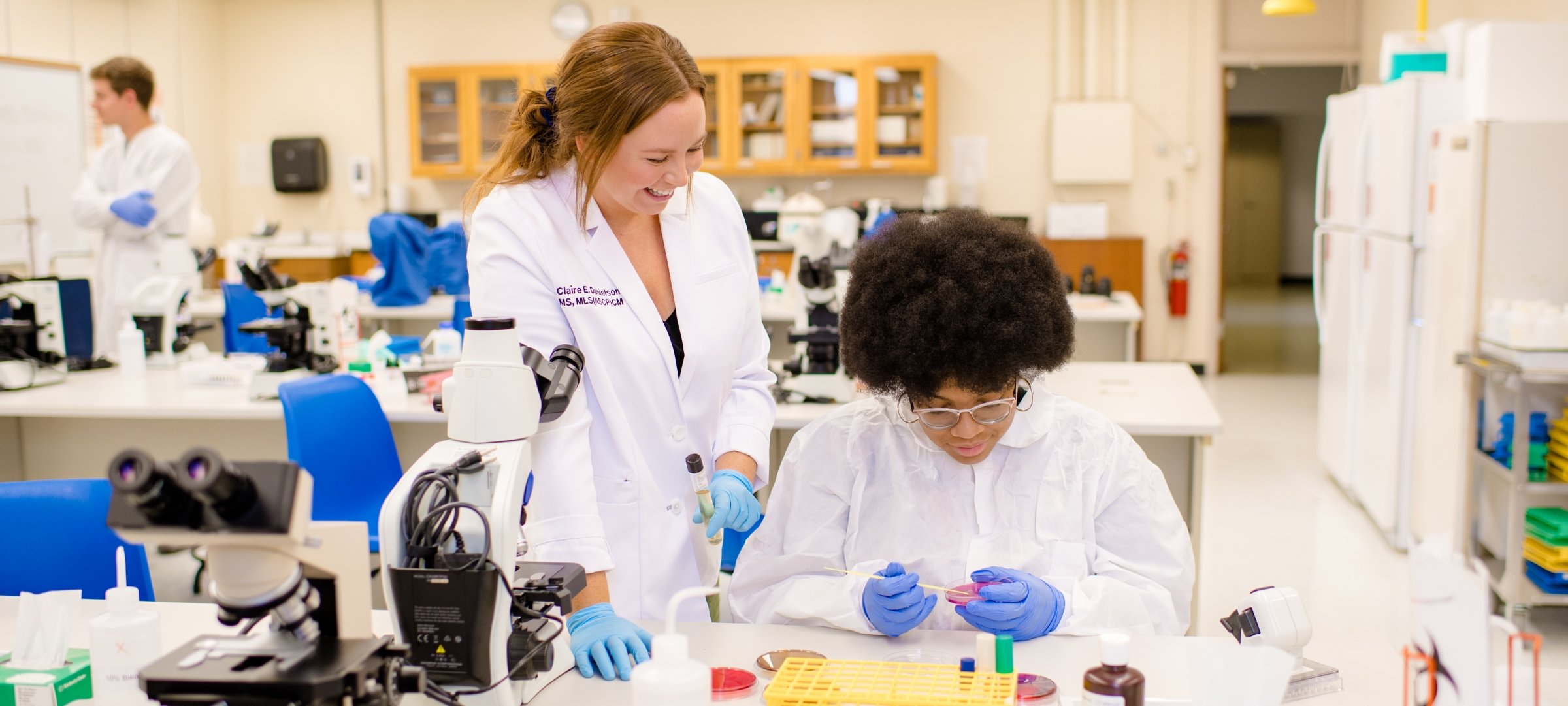Help Diagnose Ailments and Save Lives
Evaluate blood smears to detect disease. Perform crossmatches for safe blood transfusions. Identify bacterial pathogens responsible for infections. As a medical laboratory scientist, you have a direct impact on patient care through the analysis of blood, tissues, and body fluids. You become an essential part of the healthcare team, with nearly 70 percent of a physician's diagnosis based on laboratory results.
Graduates who earn a Bachelor of Science in Medical Laboratory Science at Michigan Tech receive a pragmatic, qualitative education with a strong understanding of hematology, immunology, molecular biology, clinical chemistry, medical terminology, microbiology, anatomy and physiology, and more.
Request Information
Form loading . . .
Be part of a caring and committed community of students, faculty, and staff. Take your education beyond the classroom with any number of professional organizations—including the Society of Medical Laboratory Scientists (SMLS), Microbiology Club, Phi Sigma, the Pre-Health Association at Tech (PHAT), and more. Get involved in undergraduate research and hands-on experience through job shadowing, campus EMS services, or the H-STEM Enterprise—part of Michigan Tech's one-of-a-kind Enterprise Program. Explore our Health Research Institute—a renowned health research center on campus tackling a variety of health-related challenges, such as developing material for better wound care, creating vaccines, studying alcohol's effects on the nervous system, and designing a magnetoelastic sensor for use in an artificial knee.
The fastest route to become a nationally certified medical laboratory scientist is to complete either the 3+1 or 4+1 degree concentration at Michigan Tech, get laboratory experience at one of our affiliated clinical sites, and become eligible to sit for a national certification exam.
Demand for Medical Lab Scientists is Soaring
Medical laboratory scientists are in critical demand nationwide, and with a degree from the university ranked No. 5 in Niche's Best Colleges for Biology in Michigan, Tech alumni are at the front of the line. Our graduates achieve 100% job placement after completing a clinical practicum. That's because here, you learn by doing. At Michigan Tech, you'll work in cutting-edge labs and tackle high-level research projects alongside professors who are among the best in their field. You'll also benefit from small class sizes (average 20 students), personal advising, and one-on-one faculty interaction.
Over 80 Years of Educating Medical Laboratory Scientists
Since 1941, Michigan Tech has been educating top-quality medical laboratory scientists. To accommodate our growing program and to help fill vacant medical lab positions nationwide, our BS in Medical Laboratory Science degree program became accredited in 2018 through the National Accreditation Agency for Clinical Laboratory Sciences (NAACLS). This accreditation expands the number of available clinical practicum sites available for our students in a variety of new locations throughout the Midwest.
Degree Concentrations
The BS in Medical Laboratory Science program is all about options—and with two degree concentrations available, students can choose the route that best suits them. Both concentrations offer a rigorous and engaging curriculum to prepare our students for whatever may follow—a clinical practicum, medical school, a career in industry, and more.
MLS 3+1 Concentration
If you want to take the fastest route to becoming a medical lab scientist, the Medical Laboratory Science 3+1 concentration is for you. You will spend three years on campus learning fundamental information in preparation for a fourth-year clinical practicum.
3+1 students must complete their clinical practicum at an NAACLS-accredited teaching hospital affiliated with Michigan Tech (marked with gold pins) found on the Practicum Map. Please refer to the the 3+1 degree audit for more information.
MLS 4+1 Concentration
The Medical Laboratory Science 4+1 concentration is similar to the Medical Laboratory Science 3+1 option, but with an added year on campus for additional study and specialization. You will spend four years based at Tech in preparation for a semester-long clinical practicum.
4+1 students may complete their clinical practicum at either an NAACLS-accredited teaching hospital (gold pins), or through one of our clinical affiliates (gray pins) found on the Practicum Map. Please refer to the 4+1 degree audit for more information.
70%
100%
Tomorrow Needs Talented Medical Laboratory Scientists
A bachelor's degree in medical laboratory science prepares you for a successful career—you'll help diagnose patient ailments, improving quality of life and even saving lives. With Michigan Tech's 65% acceptance into medical school (over 20% higher than the national average) you'll graduate with a secure outlook on your future career.
Career Opportunities for Medical Lab Science Majors
Your future career options are unlimited with a degree in medical lab science. Career opportunities include:
-
Cytotechnologist
-
Histotechnologist
-
Pathologist Assistant
-
Specialist in Blood Banking
-
Technologist in Blood Banking
-
Technologist in Chemistry
-
Technologist in Cytogenetics
-
Technologist in Hematology
-
Technologist in Microbiology
-
Technologist in Molecular Biology
Michigan Tech Medical Lab Science Majors Get Hired
The growing list of companies that have hired Michigan Tech medical lab science graduates includes:
- Abbott Laboratories
- Abbott Northwestern Hospital
- Aspirus Ironwood
- Aspirus Keweenaw
- Aspirus Wausau
- Corewell Health
- Detroit Medical Center
- Fisher Scientific
- Marshfield Clinics
- Mayo Clinic
- Michigan Medicine
- MyMichigan Health
- Northwestern Memorial Hospital
- UPHS Marquette
- UPHS Portage
- UW Health






